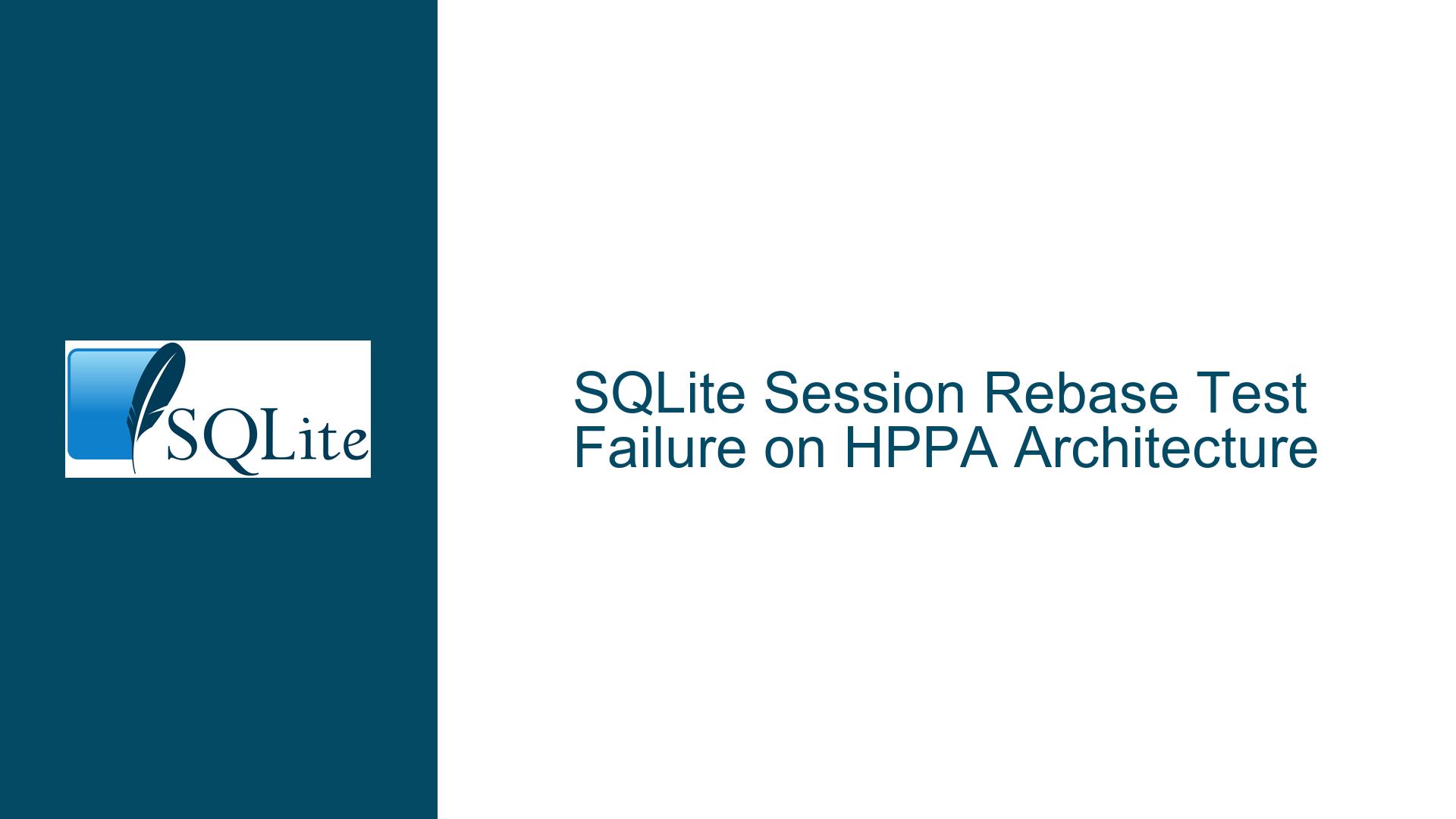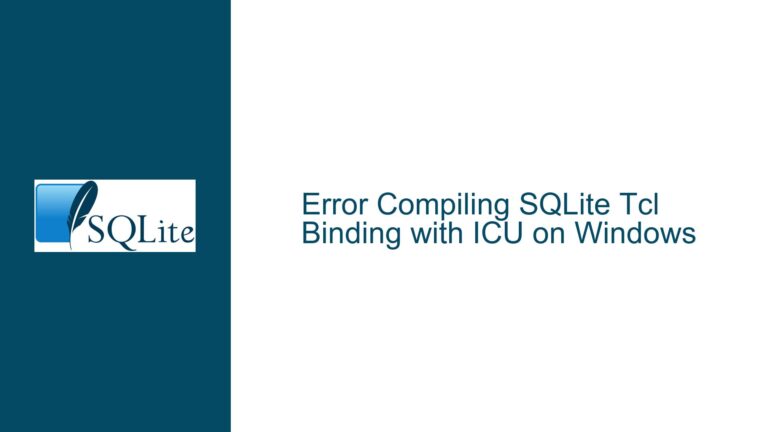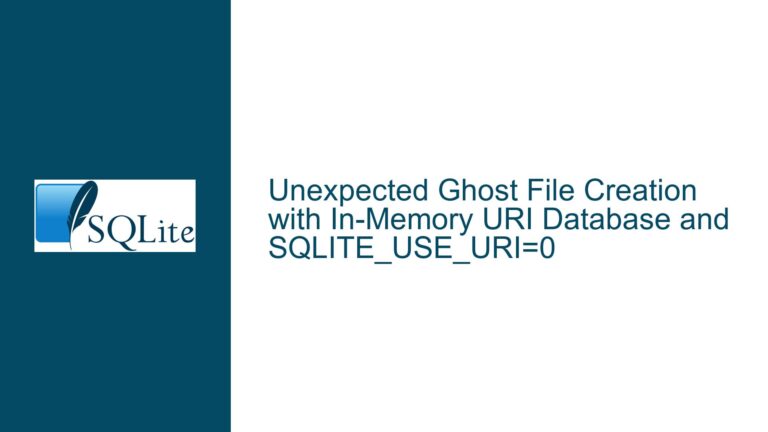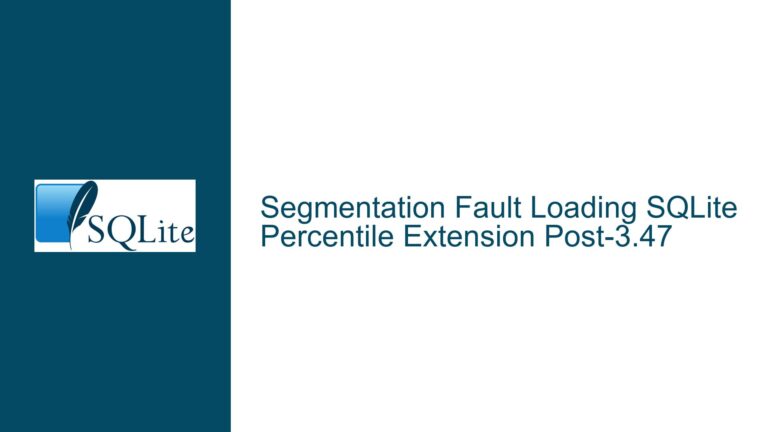SQLite Session Rebase Test Failure on HPPA Architecture
Test ext/session/sessionrebase.test:2.1.1 Fails on HPPA Architecture
The issue at hand involves the failure of the SQLite test case ext/session/sessionrebase.test:2.1.1 specifically on the HPPA (Hewlett-Packard Precision Architecture) platform. This failure is unique to HPPA and has not been observed on other architectures. The error manifests as a Tcl scripting error, where the test fixture reports an incorrect number of arguments for the R rebase CHANGESET command while executing the R delete operation. The error occurs during the execution of the do_rebase_test procedure, which is part of the session rebase test suite.
The HPPA architecture is notable for its stack growth direction, which grows upwards rather than downwards as in most other architectures. This architectural difference could be a contributing factor to the observed behavior. The test failure is significant because it indicates a potential issue with the SQLite session module’s interaction with the Tcl interpreter on HPPA systems. The session module is responsible for managing changesets, which are used to track and apply changes to a database schema or data. The failure of this test case suggests that there may be an underlying issue with how the session module handles rebase operations on HPPA.
The error message indicates that the R delete command is being executed with an incorrect number of arguments, which should instead be R rebase CHANGESET. This discrepancy suggests that there may be a bug in the C code that binds the SQLite session module API to the Tcl interpreter, or it could be an issue within the Tcl interpreter itself. Given that the problem is isolated to HPPA, it is plausible that the issue is related to the architecture’s unique stack growth direction, which may affect how the Tcl interpreter handles certain operations.
Interrupted Write Operations Leading to Index Corruption
The failure of the ext/session/sessionrebase.test:2.1.1 test case on HPPA architecture could be attributed to several potential causes. One of the primary suspects is the unique stack growth direction of the HPPA architecture. In most architectures, the stack grows downwards, meaning that as new data is pushed onto the stack, the stack pointer decreases. However, on HPPA, the stack grows upwards, which could lead to unexpected behavior in certain operations, particularly those involving memory management and function calls.
Another possible cause is a bug in the C code that binds the SQLite session module API to the Tcl interpreter. The session module is responsible for managing changesets, which are used to track and apply changes to a database schema or data. If there is a bug in the binding code, it could result in incorrect argument handling, leading to the observed error. This could be exacerbated by the HPPA architecture’s unique stack growth direction, which may affect how the Tcl interpreter handles certain operations.
Additionally, the issue could be related to the Tcl interpreter itself. The error message indicates that the R delete command is being executed with an incorrect number of arguments, which should instead be R rebase CHANGESET. This discrepancy suggests that there may be an issue with how the Tcl interpreter processes the commands passed to it by the SQLite session module. This could be due to a bug in the Tcl interpreter or an incompatibility between the Tcl interpreter and the HPPA architecture.
It is also worth considering the possibility of a race condition or timing issue. The session rebase test involves multiple operations that are executed in sequence, and if there is a timing issue or race condition, it could lead to incorrect behavior. This could be particularly relevant on HPPA, where the unique stack growth direction may affect the timing of certain operations.
Implementing PRAGMA journal_mode and Database Backup
To troubleshoot and resolve the issue with the ext/session/sessionrebase.test:2.1.1 test case on HPPA architecture, several steps can be taken. The first step is to ensure that the Tcl interpreter being used is compatible with the SQLite session module. The bug report indicates that Tcl 8.6.8 and 8.6.9 are being used, which are generally considered good versions for SQLite testing. However, it is important to verify that there are no known issues with these versions on HPPA architecture.
The next step is to isolate the issue by running the test case independently. This can be done by executing the following command:
./testfixture ./ext/session/sessionrebase.test
If the test case fails when run independently, it suggests that the issue is not related to the broader test suite but is specific to the session rebase test. This can help narrow down the potential causes and focus the troubleshooting efforts on the session module and its interaction with the Tcl interpreter.
Another useful step is to use a tool like Valgrind to check for memory errors or other issues in the Tcl interpreter or SQLite code. However, it is important to note that Valgrind does not support HPPA architecture, so this approach may not be feasible in this case. Instead, other debugging tools or techniques specific to HPPA may need to be employed.
If the issue is confirmed to be related to the SQLite session module, a patch may be required to address the problem. In this case, a patch was provided by Dan Kennedy, which was confirmed to resolve the issue. The patch can be applied to the SQLite source code and the test case can be re-run to verify that the issue has been resolved.
In addition to applying the patch, it is important to consider implementing best practices for database management, such as using the PRAGMA journal_mode command to ensure that the database is in a consistent state. The PRAGMA journal_mode command can be used to set the journal mode, which controls how changes to the database are logged and applied. Setting the journal mode to WAL (Write-Ahead Logging) can help improve performance and reliability, particularly in environments where multiple processes are accessing the database.
Finally, it is important to ensure that regular database backups are performed. This can help mitigate the impact of any issues that may arise, including those related to the session module or other components of SQLite. Regular backups can be performed using the sqlite3_backup API or by copying the database file to a secure location.
In conclusion, the failure of the ext/session/sessionrebase.test:2.1.1 test case on HPPA architecture is a complex issue that may be related to the unique stack growth direction of the HPPA architecture, a bug in the SQLite session module, or an issue with the Tcl interpreter. By following the troubleshooting steps outlined above, including isolating the issue, applying patches, and implementing best practices for database management, the issue can be resolved and the reliability of SQLite on HPPA architecture can be improved.






